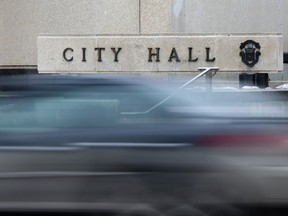
Article content
The Manitoba Municipal Board (MBB) is good for Winnipeggers as it provides accountability, transparency, inclusion, objectivity, creditability and fairness in land-use planning decisions affecting private property rights.
Advertisement 2
Story continues below
Article content
The MMB delivers checks and balances on land-use planning, protecting Winnipeggers’ private property rights from overzealous government officials.
The MMB plays an essential role on behalf of Winnipeggers to ensure the City of Winnipeg’s land-use planning decisions are meticulously scrutinized and decisions affecting private property rights are based on merits, rather than based on political grounds or other factors.
No surprise, City officials want this check on their powers eliminated because un-elected people on the MMB make decisions. City officials desire unchecked power concentrated solely within their unelected bureaucracy as the discretionary decision maker brandishing absolute power over peoples’ private property rights.
Advertisement 3
Story continues below
Article content
City officials opposed the 2021 provincial government reforming the MMB: an independent, impartial, quasi-judicial tribunal of unelected people appointed by government to make some land-use planning decisions.
Manitoba’s land-use planning decisions by the MMB are aligned to Saskatchewan, Ontario, Alberta, New Brunswick, and Nova Scotia. The United States embraces the election of judges, sheriffs, township clerks, etc. Yet, cities and counties across the U.S. are proliferated with tribunals and commissions of unelected people guiding land-use planning affecting private property rights enshrined in the Fifth Amendment.
North American jurisdictions commonly enshrine a separation of powers for land-use planning decisions affecting peoples’ private property rights. Many tribunals and commissions include unelected people with no interest or bias in a case or bias towards the persons in the case. But not Winnipeg. Winnipeg was an outlier. Limited provisions for checks and balances to guarantee natural justice or procedural fairness, the right of proponents or opponents to be heard before an impartial decision maker.
Article content
Advertisement 4
Story continues below
Article content
Planning decisions on private property rights were concentrated with City officials wielding absolute power. The City eliminated its arms-length tribunal of citizens appointed to decide minor changes to peoples’ private property rights, in favour of strengthening unelected bureaucrats to rule over private property rights.
Citizens had no options outside the courts to resolve conflicts with City officials regarding land-use planning affecting their private property rights. Hard-working, modest-income people do not have the monetary depth to seek justice before the Courts in a legal battle of financial attrition against an entrenched local government.
And then Parker Lands happened. The courts, unelected people, repeatedly ruled against the City for questionable treatment of private property owners.
Advertisement 5
Story continues below
Article content
First, a court order compelling City officials to perform a duty mandated by law. City officials did not carry out the judge’s order. The City was then found in contempt of court — the willful disobedience of a Judge. City officials still did not carry out the court order. The City was found in contempt of court again and again, before finally performing its duties. At one point, a City bank account was garnished.
Court findings in the Parker Lands case reveal City officials purposefully blurring professional opinions with personal preferences — preferences not reflective or based on any acceptable professional, industry or government standard — to oppose planning decisions on private property rights. A King’s Bench judge found one City official’s opinions and recommendations “rose at times to the level of ridiculous.”
Advertisement 6
Story continues below
Article content
A rational, reasonable and responsible public response to the court rulings by City officials recommitting to order and good government — has not materialized. No self-improvement on land-use planning, zoning and permitting. No job performance assessments for City officials. Limited accountability for City officials failing to meet organizational goals and objectives.
The provincial government’s logical response in 2021: establish an independent, neutral tribunal to provide justice between Winnipeggers and their local government. The MMB’s mandate includes some land-use planning decisions, enhancing the public’s ability to readily access justice to resolve some disputes outside of the courts.
Advertisement 7
Story continues below
Article content
MMB public hearings are fulsome, methodical, inclusive and transparent. MMB appeal hearings may last several days with one agenda item. Expert witnesses (planners and engineers including City officials) are placed under oath and subjected to rigorous questioning by the panel and thorough cross-examination by lawyers. The meticulous questioning of an expert witness occurs in the public eye and may take several hours or days.
Appeal hearings are open so the public can watch in person, listen and participate. Elected officials can participate to advocate on behalf of constituents. Tribunal members are independent and impartial, core principles of natural justice.
The provincial government in 2021 mandated a comprehensive follow-up review of the legislation for the MMB to be completed by Oct. 29, and to table a report in the Legislature in 2025.
Advertisement 8
Story continues below
Article content
A government intent on serving City officials will grant its ultimate wish of wielding absolute power, eliminating the transparency and accountability mechanisms provided by the MMB. This would be a loss for citizens, costly to taxpayers as disputed matters with City officials will return to the courts in greater frequency.
A government intent on serving the public interest and prioritizing good government, will uphold the current balance of powers and bolster the MMB.
Government needs to expand the MMB’s scope to better protect people from over-reaching, overly ambitious City officials with grand designs on brandishing absolute power. The MMB’s resources also need to be enhanced to enable timely decisions to ensure fairness in land-use planning decisions affecting Winnipeggers’ private property rights.
— John Wintrup is a lifelong Winnipegger, urbanist, globetrotting city explorer, Harvard student, and professional planner with a M.Sc. Planning degree and holder of multiple planning accreditations in both Canada and the United States.
Article content
Comments